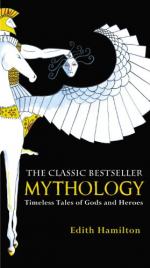|
|
Mythology Part 5: Great Families..., Chapter 1: The House of Atreus
Agamemnon and his brother Menelaus were members of the ill-fated house of Atreus. Their first unfortunate ancestor was Tantalus, a King in Lydia. He was the son of Zeus and was honored by the gods beyond all other mortals. He was allowed to eat with the gods, and in return for this honor, he killed his son Pelops and fed him to the gods. However, the gods would not eat the flesh of a human. They sent Tantalus to the underworld and he was to be tortured forever. He was placed in a pool that would fill with water until he tried to drink it and beneath fruit that would descend until he reached for it. Tantalus' transgression against the gods was the act that kept the divine and mortal from ever celebrating together again.
Pelops was put back together by the gods; they could not find his shoulder, so they replaced it with ivory. He wooed a dangerous woman. He won her by racing her father's prize horses and eventually killing the charioteer. He used Poseidon's horses. Pelops' sister Niobe was married to a son of Zeus and they ruled Thebes together. She bore fourteen children. She asked the people to worship her instead of Leto, the mother of Apollo and Artemis. The twins turned Niobe and her children into stone. Pelops had two sons, Atreus and Thyestes. Thyestes fell in love with Atreus' wife and Atreus killed his brother's children and fed them to him.
His wife's lover Aegisthus, the son of Thyestes and his cousin, killed Agamemnon. Some think that Clytemnestra killed her husband as revenge for the sacrifice of their daughter Iphigenia. Menelaus and Agamemnon ended their lives differently. Menelaus was lost near the Nile but returned home and died in prosperity. Agamemnon died at the hands of his wife and her lover. When he returned home as a conqueror, the elders of Argos were apprehensive because they knew of his wife's infidelity. Others were worried about the sacrifice of his daughter. Clytemnestra approached her long gone husband and "She knew that every man there except for Agamemnon was aware of her infidelity." Part 5, Chapter 1, pg. 354. She faced him and welcomed him home. The elders of the town grew uneasy as she began to lead him inside. Agamemnon called for Cassandra to come out. The prophetess freaked out because she saw the palace as a house hated by the gods. She knew that she and Agamemnon would die that day. Clytemnestra killed him and felt no sorrow because she was sure she had avenged her daughter. Agamemnon's other children were Electra and Orestes.
When Orestes grew older, he went to the oracle at Delphi and asked what he should do about the murders. The oracle told him to kill both of the murderers. He was grief-stricken because this meant killing his mother. He and his cousin went to the palace pretending to bear news of his death. He killed the lover first while his mother tried to reason with him. Orestes killed her and was immediately pursued by the shadowy figures of the furies. It would be many years before they ceased pursuing him. He pleaded in the temple of Athena, arguing he had atoned for his sins, something a member of his family had never done. Athena heard his pleas and the furies stopped their pursuit.
There is an alternate tale about the sacrifice of Iphigenia. Her sacrifice was meant to appease the wrath of Artemis over the death of one of her creatures. When she was laid on the altar, Artemis replaced Iphigenia's body with that of a stag and took her to the far away land of the Taurians. She was made a priestess in a temple where they sacrificed Greeks. Her job was to prepare the men before sacrifice. Years later, Orestes and his cousin appeared in the country. They had been charged with the mission of stealing the image of Artemis in the temple and taking it back to Athens so that Orestes could atone for his sins. They were caught and brought to Iphigenia to be prepared for sacrifice. The siblings did not recognize each other until Iphigenia proposed that she release them. In exchange they would carry a letter to her brother in Greece. Orestes introduced himself and she begged that they take her home. "Dearest! You are my dearest, my darling, my dear one. A baby, a little baby, when I left you. More than marvelous is this thing that has come to me!" Part 5, Chapter 1, pg. 369 They tried to decide how to leave. Orestes proposed killing the king, but Iphigenia opposed this plan. She told the king that the men were unclean and needed to be taken to the ocean to be cleansed for sacrifice. He believed them and when they got near the shore, they tried to escape in a ship. The king was about to send a fleet after them, but Athena appeared and told him to let them go.
Topic Tracking: Atrocity 10
Topic Tracking: Women 17
Topic Tracking: Fate 9




